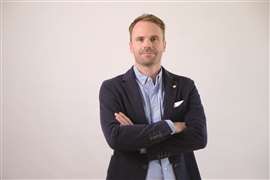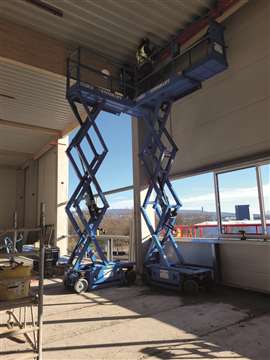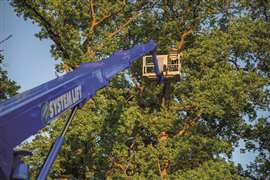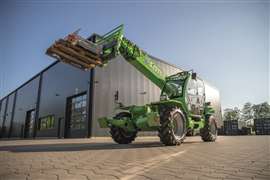Professionalizing access rental - the System Lift way
22 August 2024
System Lift is going from strength to strength as the answer to the fragmented rental market in Germany. Christopher Friedrich, a member of its executive board, explains how the cooperative is taking rental into the future, as well as delving into the provisional tariffs on China-produced MEWPS, VR training and consolidation.
One of System Lift’s key aims is to help professionalize independent rental companies in the country, as well as in Austria and Switzerland where the organization also operates.
Its 75 partners across 135 depots, mainly located in Germany, benefit from centralized buying power, cross rentals within the System Lift community, a strong brand and marketing. They also get access to the in-house System-Card training system.
 Christopher Friedrich, member of the executive board responsible for purchasing, marketing and partner management, System Lift. (Photo: System Lift AG)
Christopher Friedrich, member of the executive board responsible for purchasing, marketing and partner management, System Lift. (Photo: System Lift AG)
In 2023, System Lift recorded an increase in rental sales of 9%, compared to the previous year, closing the financial year with a new record rental turnover of €300.7 million. It meant, every fifth order from its partners was processed within the System lift community.
A fundamental reason why an organization such as System Lift works so well in Germany is the country’s unique rental market, which is not dominated by large nationwide firms. Instead, there is a history of small, local family-owned players with deep and longstanding relationships with their customers.
The association chooses its partners carefully with just one rental company in each designated region, as a rule, able to join.
Buying trends
Last year, the rental companies that are part of System Lift acquired machines worth more than €100 million, says Christopher Friedrich, member of the executive board responsible for purchasing, marketing and partner management.
“To get the best purchasing conditions, you have to buy in sufficient volume, which is why there is an agreement that System lift partners only buy machines from manufacturers with whom we have a fixed contract, and everyone benefits from this.”
According to Friedrich, System Lift has one of the top three accounts with Genie in Europe, amounting to almost €30 million each year. It also has one of the largest accounts with Merlo at €20 million and the largest with Ruthmann. It also has contracts with the traditional European OEMs like JLG, Multitel and Niftylift, to name three.
In addition, Chinese manufacturers have been taken into consideration. Last year, System Lift entered a framework agreement with Sinoboom, and established a partnership with Magni five years ago, originally for its telehandlers but now also for MEWPs that are produced by Dingli and sold in Europe through the Italy-based company. In 2023, System Lift bought machines from Magni worth more than €10 million, most of which were MEWPs.
“Magni is doing a very good job in Germany, not just selling machines - they also provide very good after sales service,” Friedrich says.
As he goes on to explain, “In 2022, we started to do an in-depth test of all relevant Chinese manufacturers and afterwards we chose Sinoboom, not just regarding the good quality of products, but also for their production facility in Poland and because they have a headquarter in Rotterdam, more than 30 industry-known people working for them.”
Assessing the tariffs
 System Lift partner Moeller Manlift operating in a remote location. (Photo: Moeller Manlift).
System Lift partner Moeller Manlift operating in a remote location. (Photo: Moeller Manlift).
On this note, it is hard to ignore the provisional tariffs that have been released by the European Commission, which is carrying out an investigation into alleged dumping of MEWPs in the European Union by manufacturers in China. If the proposed tariffs do come into fruition, it could mean duties of up to 56.1% imposed on those goods.
Friedrich has mixed views on the matter but is concerned duties could negatively impact the sector. “If these tariffs are approved, machine prices will rise temporarily, at least in the medium term.“
“I spoke to a manufacturer based in China about what would happen in terms of costs if they were to relocate their production to Europe. In that case, they would expect a price increase of 15-20%. So the important question is whether machine prices will rise, but more importantly, whether the industry will be able to adjust rental prices accordingly.”
Friedrich adds, “Due to inflation, for example, we have already raised rental prices in last two years but there are several others - larger rental companies that rent their machines at very low prices, and this won’t work out long-term.”
As Friedrich points out, China-based manufacturers have been preparing for the situation by building their stock in Europe in readiness for the proposed tariffs. “For example, one here has more than 10,000 units.”
“Are the tariffs a good idea? Overall, I don’t think they are,” Friedrich concludes.
Training in the virtual world
Another advantage of the System Lift partners is that the organization is a joint-stock company that is not listed on the German stock exchange. This means that the only shareholders are its partners.
“The only shareholders we have are System Lift partners, and in the last 20 years we have paid out dividends of more than €10 million. If the System Lift stock company is successful, then members benefit too.”
In addition to procurement and potential dividends, System Lift partners benefit from other services, such as the System Lift training system.
Last year, System Lift recorded a 13% increase in the number of participants - a new record.
The organization had more than 35,000 trainee participants in 2023. “In recent years, we have expanded the portfolio of face-to-face training and additionally developed high-quality, flexible e-learning that has been very well received.”
The System Lift training program covers all types of aerial platforms, industrial trucks and telehandlers, cranes, earthmoving equipment, slingers and PPE users. Although it should be noted that System Lift members are MEWP and telehandler operators and there’s no plan to expand into generalist rental equipment.
In Germany, the System-Card is the market leader for operator licenses. “It is an international certification that is recognized everywhere.”
“We have more than 130 System-Card trainers and the difference with us is that only our partners can have a training center.
“We train the trainers who are then able to train their customers with the machines,” Friedrich says.
An important development is the expansion of the program to give trainees the opportunity to use virtual reality (VR), including some hands-on experience.
 (Photo: Moeller Manlift).
(Photo: Moeller Manlift).
This means that System-Card training can take place anywhere and be streamed so that other participants can see what the person wearing the headset is experiencing.
It uses the same Meta Quest 3 headset used by Genie in its virtual reality training program launched last year, although the software has been developed separately.
“We started the VR program about 3.5 years ago. There are different offerings, but we wanted to develop VR training without a lot of operational hurdles to make it as easy as possible to use anywhere.”
“We also wanted it to be easy to use with a laptop and goggles and for it to be relatively inexpensive for our training centers to invest in. We can go anywhere with it.”
In the first nine months since its launch in March 2023, more than 180 training courses for aerial platforms were conducted using the System-Card VR application. “We are seeing a sharp increase in the number of participants using VR.
Expansion philosophy
Growth for System-Lift is limited due to the general rule that each region is restricted to one partner and, if necessary, existing partners cede parts of their territory to new partners by mutual agreement. “Within the last six months, we have had five new partners - not only small rental companies, but also larger ones with a cumulative fleet size of around 1,500 aerial work platforms.
“Of course,” adds Friedrich, “It would be interesting to expand to other European countries but the most important thing for us is to be able to speak together, therefore it’s also important to have the same language and the same culture, so we are going to stick within the Germany, Austrian and Swiss region.”
“We have strategic partnerships with Poland and Netherlands and Italy, but we are convinced we need to speak one language to be successful and work together closely.”
After visiting China Friedrich says he was approached by rental companies based in the country interested in setting up a similar operation, run by System Lift. But Friedrich and his colleagues declined the invitation. “When you do something like that you have to do it 100% and we are convinced that we have far more business opportunities within German-speaking area with our model than in other regions.”
Market view
 Photo: System Lift AG
Photo: System Lift AG
On that subject, the rental market in Germany is looking hopeful. “For most System Lift partners 2024 has worked out quite well - we don’t see a decrease in our figures but what we do see is some sectors struggling, especially construction.
“However, there are other sectors like energy transformation where there’s lots of potential. In Germany, overall, its more difficult than previous years but our guess is that is going to change during 2025.”
There has been continuing consolidation in the mature rental markets of North America and Europe in recent times, but while acquisitions have taken place in Germany – for example Kiloutou’s recent drive in the county, Friedrich forecasts that its traditional rental model will remain strong.
“Consolidation is happening but what is really happening is that the rental industry is professionalizing.”
In Friedrich’s view it is difficult for international companies to make their way in Germany, as the rental market is already full. “There is no region in Germany where there are no rental companies doing business.
“They would have to compete with local rental companies that have been working in these areas for years. These small companies have been doing their jobs for years. They know what works and they have a really good local network.”
Therefore, rather than consolidation changing the market into a more mature one, it is the actions of organizations like System Lift that are providing the services that these local companies need to compete in the modern world.
“The market is becoming more professional, partly because we help our partners to become more professional. We offer our partners a 360-degree service portfolio to maximize their success. This allows them to focus on what they do best – renting out machines and providing operator trainings – and leave the rest down to us. For example, there is no need for them to hire two or three separate people to do marketing – that´s our service to them.”
New generation
Germany has a tradition of small family-run rental companies, where the next generation of management will be key to their future.
“When we talk about professionalism, there are numerous rental companies at which the next generation is taking over, and what we can see is that where the young generation does take the lead, the speed of change and more professionalism is much higher.”
 Photo: System Lift AG
Photo: System Lift AG
“Of course, it will always be the case that big companies buy smaller, single rental companies where the owner sells because no one from the family is interested in taking it over.”
Friedrich adds, “But the market itself is not changing that much. You cannot compare the German market to other markets – it’s difficult to enter.”
Having said that, Friedrich is following the activities of the world’s largest rental company, United Rentals. Based in the US, the rental giant recently indirectly entered Germany through its acquisition of European equipment rental business EQIN, headquartered in Rotterdam.
EQIN provides a range of equipment, such as generators, compressors, welding equipment and lighting towers and has a number of depots throughout the Benelux region, including seven in the Netherlands and one in Belgium.
Following a merger with its competitor Indu-Tools Group, EQIN also moved into the German market last year with the purchase of ToolsRent24.
“We are quite interested in the plans of United Rental, but we are secure in our model,” says Friedrich.
In recent weeks System Lift held its annual general meeting and dinner. There were 120 participants in attendance, with only three or four of its partners missing. This says Friedrich demonstrates the strength of the community organization.
“Our business network is all about sticking together and it’s certainly not just about renting at the cheapest price,” he says. “To be honest, we are probably not the cheapest and we don’t want to be. Because we want to deliver the best quality and the best service for all our customers.”




